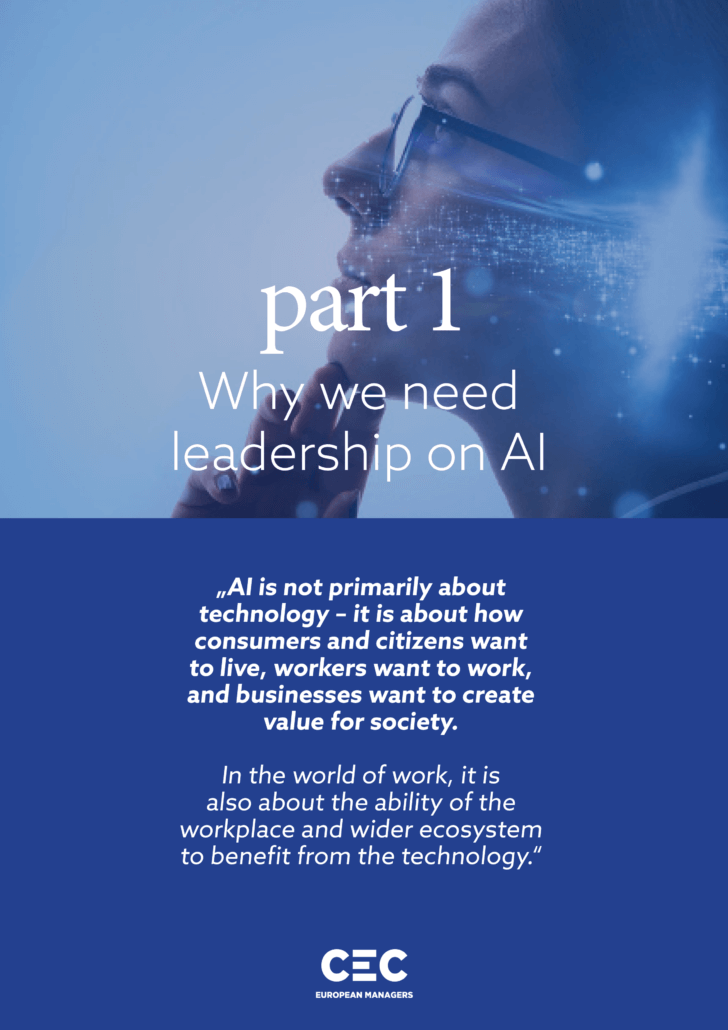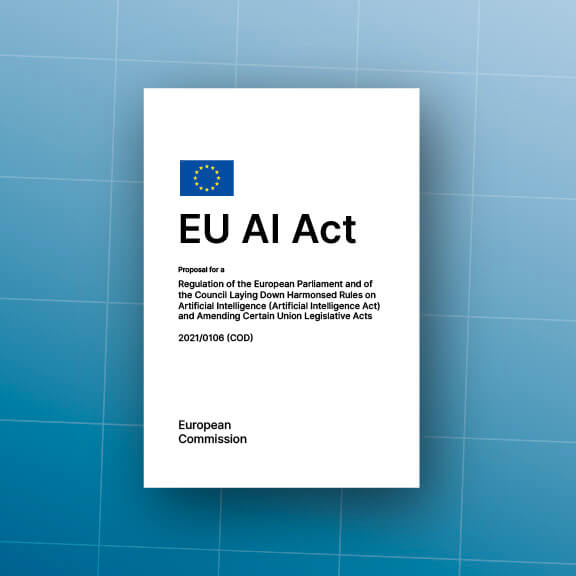EU Managers put leadership on the Artificial Intelligence agenda
- CEC European Managers publishes its position paper on the role to be played by management before Artificial Intelligence.
- Leadership is crucial to the purposeful implementation of Artificial Intelligence tools.
- Several risks regarding privacy and the lack of ability to monitor the real productivity of the workforce have been identified
“Artificial Intelligence is about how consumers and citizens want to live, workers want to work, and businesses want to create value for society.”
CEC European Managers

The Leadership and Partnerships for Purposeful AI position paper has just been released and is being distributed by CEC European Managers, representing around 1 million managers in the European Union and one of the European Commission‘s social partners.
This position paper sheds light on a crucial moment in the public discussion about the limits and scope of AI in the context of EU Member States. Following the approval of the first Artificial Intelligence Act by the European Parliament and the proposals launched by the European Commission in 2021 and 2022, worldwide, the way to regulate Artificial Intelligence occupies a large part of the current international politics.
In that sense, on 13 March 2024, the European Parliament approved the AI Act, which aims to ensure safety and compliance with fundamental rights while boosting innovation in Europe.
An international milestone
The AI Act is an international milestone in regulating Artificial Intelligence, and many countries outside the European Union are expected to consider and make use of the strategic and regulatory framework (as well as the solid foundation underneath) approved by the 27 EU-Member States.
Among other things, the new rules ban specific AI applications that threaten citizens’ rights, including biometric categorisation systems based on sensitive characteristics and untargeted scraping of facial images from the internet or CCTV footage to create facial recognition databases.
Some other uses that are also banned are motion recognition in the workplace and schools, social scoring, predictive policing, and all sorts of AI that manipulate human behavior or exploit people’s vulnerabilities will be also forbidden from now on.
The EU is taking the lead in protecting fundamental rights, democracy, the rule of law and environmental sustainability from high-risk Artificial Intelligence, but also in setting up fair rules and in boosting innovation.
European Parliament, AI Act
The Artificial Intelligence Act responds directly to citizens’ proposals from the Conference on the Future of Europe (COFE).
The European Commission Proposal and the AI Act
In 2021, the European Commission proposed the approval of an agreement regarding the use of Artificial Intelligence in Europe, and one year later, in 2022, it shared a proposal for a directive on adapting non-contractual civil liability rules to AI, called the ‘AI liability directive’.
After months of negotiations, the 27 Member States of the European Union endorsed the AI Act and since the beginning of 2024, it has entered into force.
The AI Act limits and even prohibits certain categories of Artificial Intelligence tools that pursue malicious objectives or outcomes contrary to democratic values, such as deploying subliminal, manipulative, or deceptive techniques to distort, impair informed decision-making, or nurture biometric categorization systems that infer sensitive attributes.
You can read the latest updates and all the content related to the AI Act here: https://artificialintelligenceact.eu/the-act/
Meanwhile, new rules are being debated that intend to ensure that people harmed by AI systems enjoy the same level of protection as people harmed by other technologies in the EU.
All this is happening under the watchful eye of stakeholders and academics, who seem to question the proposed liability regime’s effectiveness, its coherence with the Artificial Intelligence Act, and its potentially detrimental impact on innovation.
In this context, he position paper of CEC European Managers makes the voices of European managers and leaders heard, as they play a crucial role in ensuring that Artificial Intelligence will always be under good human management.
Position paper: Leadership and partnerships for purposeful AI
This new CEC European Managers position paper results from the debate and research work of the Working Group of CEC European Managers on Digitalisation and Artificial Intelligence, led by the president of the confederation, Maxime Legrand.
 Divided into two distinct parts, the first one being Why we need leadership on AI, the organization notes that managers are observing the expansion of AI in the working world, not as a tool that replaces workers but as a valuable resource for reorganizing tasks.
Divided into two distinct parts, the first one being Why we need leadership on AI, the organization notes that managers are observing the expansion of AI in the working world, not as a tool that replaces workers but as a valuable resource for reorganizing tasks.
For this reason, managers suggest that good leadership must accompany the ongoing AI optimization process by facilitating and enhancing soft skills, context understanding, ethical considerations, systems and future thinking, team empowerment, and life cycle design.
In this sense, European managers warn that lack of leadership and managerial competencies is an obstacle to making AI a purposeful and adapted tool for the unique needs of businesses and the workplace, and reminds us that technological progress must be in the service workers’ lives’ improvement.
Other discussed risks refer to employees’ privacy, as it seems quite evident that “AI-driven tools designed to flag employee behavior that may indicate depression, burnout, or leaving the companies are pushing the limits.”
To mitigate these risks, the CEC European Managers recommends that the legislation gradually approved by the European institutions remains as close as possible to the reality of managers’ work.

The second part of the position paper, Recommendations to leaders on AI, contains valuable guidelines for policymakers regarding implementing effective European legislation.
Leadership on AI, the right to a manager, the approach towards a more two-way social partnership, and the promotion of entrepreneurs via funding (e.g. European projects) are the main points managers put on the political agenda through CEC European Managers.
We encourage European policies to contribute to climate and biodiversity action and support fair and distributive value creation.
You can read, download, and share the Position paper: Leadership and partnerships for purposeful AI [here+].
© Leadership and Partnership for Purposeful AI,
Position paper Published by CEC European Managers, January 2024
Hashtag: #AILeadership
Written with the contributions of the Working Group of CEC European Managers on Digitalisation and Artificial Intelligence:
Blaž Strle, Slovenia – Managers’ Association of Slovenia (MAS)
Carla Cunha, Portugal – Bank Managers’ Union (SNQTB)
Pedro Rola, Portugal – Bank Managers’ Union (SNQTB)
Antonio Ferrara, Italy – Italian Managers’ Confederation (CIDA)
Nicolas Blanc, France – French Managers’ Union (CFE-CGC)
Hannes Sjoblad, Sweden – Swedish Managers’ Union (Ledarna)
From CEC European Managers:
Maxime Legrand, France – President
Jean-Philippe Steeger, Belgium – Policy and Project Officer











